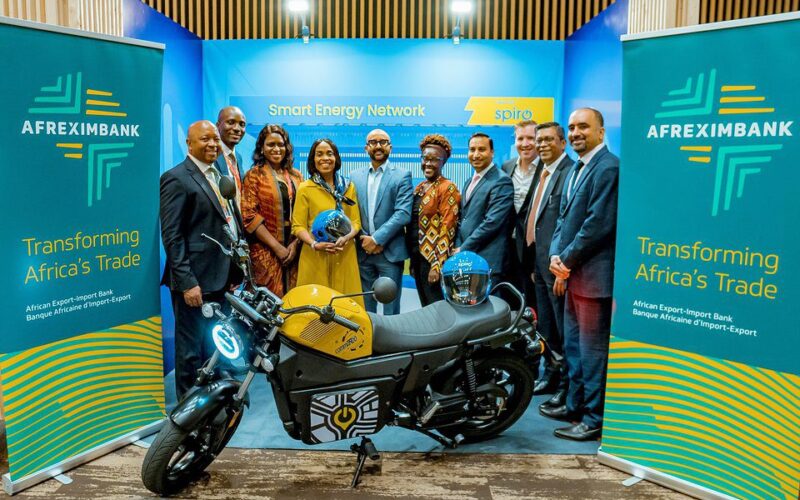Spiro, Kenya’s leading electric two-wheel transportation and battery-swapping company, has secured $100 million in funding to accelerate its mission of transforming Africa’s urban mobility landscape with affordable, sustainable transportation solutions.
The substantial investment positions the company to expand its already extensive battery-swapping infrastructure across existing and new African markets while strengthening its technology platform to serve the continent’s rapidly growing demand for clean energy transportation.
Africa’s Largest Electric Mobility Network
Spiro operates the continent’s most extensive battery-swapping network for electric motorcycles, having established itself as Africa’s largest electric mobility company. The company’s impressive operational statistics demonstrate the scale of its impact on sustainable transportation across the continent.
With more than 60,000 electric motorcycles on the road, over 1,200 battery-swapping stations, and more than 26 million battery swaps completed to date, Spiro has facilitated over 800 million kilometers of low-carbon emissions travel. These numbers represent a significant shift away from expensive, imported fossil fuel-based transportation toward affordable and accessible sustainable alternatives.
Strategic Funding from Afreximbank
The $100 million funding round includes $75 million from The Fund for Export Development in Africa (FEDA), the development impact investment arm of the African Export-Import Bank (Afreximbank). This partnership signals strong institutional support for Africa’s electric mobility transition and represents one of the largest investments in the continent’s clean transportation sector.
“Our investment reflects Afreximbank’s strong commitment to building a competitive and sustainable mobility sector in Africa,” said Professor Benedict Oramah, president of Afreximbank and chairman of the boards of directors of both Afreximbank and FEDA. “Together, we are laying the groundwork for a new era of intra-African trade and industrialization by stimulating local vehicle manufacturing, strengthening regional integration, and enhancing trade flows.”
Made in Africa, By Africans, For Africa
A cornerstone of Spiro’s strategy is its commitment to local manufacturing and assembly. The company operates production facilities in Uganda, Kenya, Nigeria, and Rwanda, building an expanding regional production network that creates jobs and reduces dependence on imported vehicles.
This localized approach supports Afreximbank’s broader vision of reducing the continent’s reliance on imported second-hand vehicles while creating skilled employment opportunities and stimulating intra-African trade. By producing electric vehicles locally, Spiro contributes to regional economic integration and industrialization efforts across Africa.
Aggressive Expansion Plans
With the new funding in place, Spiro has set ambitious growth targets. The company expects to surpass 100,000 deployed vehicles by the end of 2025, which would more than double its current fleet and reinforce its leadership position not just in Africa but among the world’s foremost battery-swapping providers.
The investment will primarily support the expansion of Spiro’s industry-leading battery-swapping infrastructure across both existing markets and new territories, ensuring riders have convenient access to the charging network that makes electric motorcycle adoption practical and profitable.
Economic Benefits Driving Adoption
According to Kaushik Burman, CEO of Spiro, the shift to electric motorcycles is being driven by compelling economic advantages rather than environmental concerns alone. “Africa is at an inflection point in personal mobility. Riders are rapidly shifting from internal combustion motorcycles to Spiro’s more affordable and accessible battery-swapping ecosystem and motorcycles,” Burman explained.
“For the first time, riders are embracing sustainable transportation because it performs better, costs less to operate, and offers greater profitability than traditional gas-powered vehicles,” he continued. This economic advantage is crucial in markets where motorcycle taxis and delivery services represent essential income sources for millions of riders.
Building Pan-African Infrastructure
Burman emphasized that the $100 million investment represents more than capital for expansion. “This landmark investment underscores our shared vision to build a pan-African battery-swapping infrastructure that empowers riders with reliable, sustainable energy and mobility across the continent,” he said.
The battery-swapping model solves several critical challenges facing electric vehicle adoption in Africa, including limited charging infrastructure, high upfront costs, and concerns about battery lifespan and replacement costs. By separating battery ownership from vehicle ownership, Spiro makes electric motorcycles accessible to riders who might otherwise be unable to afford the transition.
Environmental and Social Impact
Beyond the economic benefits, Spiro’s operations deliver significant environmental advantages. The 800 million kilometers of low-carbon travel achieved to date represents a substantial reduction in greenhouse gas emissions and air pollution in Africa’s rapidly urbanizing cities.
The company’s model also addresses energy access challenges, as battery-swapping stations can integrate with renewable energy sources and provide grid stabilization services while serving transportation needs.
Future of African Mobility
As African cities continue to grow and urbanize, sustainable transportation solutions become increasingly critical. Spiro’s success demonstrates that electric mobility can be both economically attractive and environmentally beneficial when supported by appropriate infrastructure and financing.
The $100 million investment from FEDA and other investors signals growing confidence in Africa’s electric mobility sector and sets the stage for continued expansion of clean transportation options across the continent. With plans to double its fleet by 2025 and expand its battery-swapping network, Spiro is positioned to lead Africa’s electric vehicle revolution.












